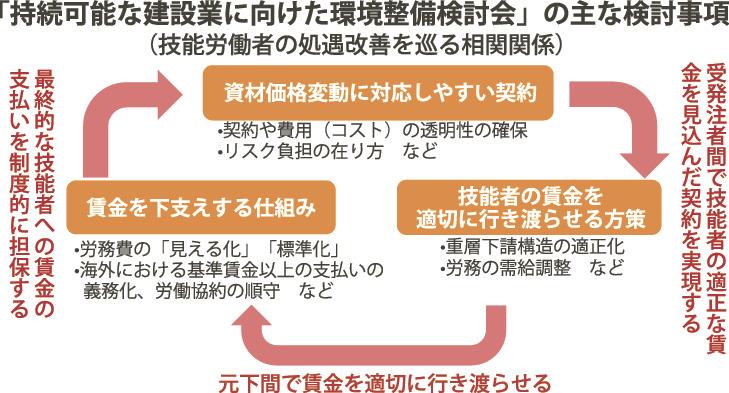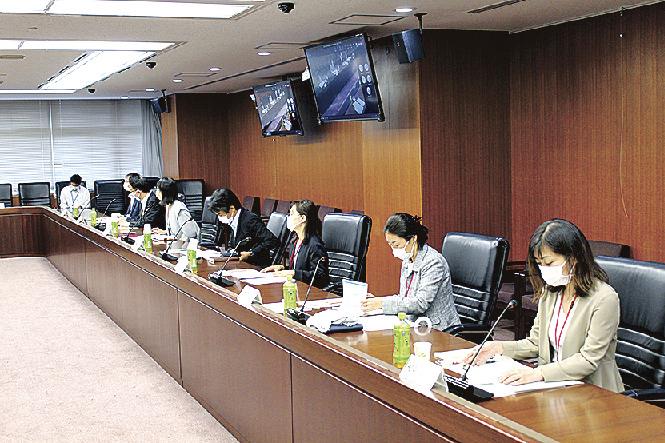The next step to improve working conditions - Responding to soaring material prices, above / Eliminating the gap with the private sector orderer

Members of the investigative committee = At the third meeting held at the Ministry of Land, Infrastructure, Transport and Tourism in Kasumigaseki, Tokyo on September 8

◇Price pass-through, standard terms and conditions do not work
Due to the nature of the total price contract, it is difficult to introduce a sliding clause. This view, presented by the real estate industry, which is a major client of private construction projects, presents a harsh reality to the construction industry, which is suffering from soaring prices of construction materials. Accepting the current situation in which the contractor has no choice but to swallow the risk of price fluctuations may lead to a deterioration in the business situation and a burden on subcontractors. In order to keep the gears of the public and private sectors working together to improve the treatment of skilled workers, it is necessary to build new relationships of trust with private-sector clients without being bound by conventional business practices. Prospects will be explored from the discussion of the Ministry of Land, Infrastructure, Transport and Tourism's expert panel "Environmental improvement study group for sustainable construction industry".
The Ministry of Land, Infrastructure, Transport and Tourism's investigative committee will finally enter the stage of summarizing discussions after hearing from contractors, realtors, and other contractors. There are a number of difficult themes, such as dealing with price fluctuations and optimizing the multilayered subcontracting structure, but all of them are in a cyclical structure in the sense of unraveling the structural issues of the industry surrounding the improvement of the treatment of skilled workers (see figure).
After realizing a contract that anticipates the appropriate wages of skilled workers between the ordering and receiving parties, it will be distributed appropriately between the subordinates and the final payment will be systematically guaranteed. If even one of them is missing, it will be inadequate, and the maximum effect will be achieved when all are connected and functioning. Beyond that, the road to a sustainable construction industry will open up.
At last month's hearing, the discussion focused on how to deal with the recent surge in material prices. The construction industry complained of the predicament that many of the private construction projects were not accepted even if they offered to negotiate price hikes due to the steep rise in material prices. On the other hand, major developers restrained the construction industry's move to apply the sliding clause. He explained that price fluctuation risk is incorporated into the contract, which is the mainstream for private construction projects, and argued that if the contract amount is fixed, risks can be dealt with in the area of expertise of each individual.
We were supposed to deepen our consideration of how to appropriately share the risk of price fluctuations among the ordering and receiving parties, but what became clear at that time was the gap between the two ways of thinking.
After the hearing, several members pointed out the dysfunction of the standard contract terms and conditions for private construction projects created and recommended by the Central Construction Industry Council (Chukenshin). The standard contract stipulates that ``changes in the contract price can be requested'' for reasons such as drastic changes in economic circumstances and price fluctuations. However, in actual contracts, there are many cases where this provision is deleted or modified at the request of the ordering party. The reality that contractors have to unilaterally bear risks has been revealed by the rapid rise in material prices.
According to Attorney Fumihiko Omori (Professor Emeritus, Toyo University), who has been involved in the revision of the standard clauses and the construction contract clauses of the private sector (Nanakai) coalition created by private construction-related organizations following its recommendations, Standard terms and conditions are positioned as a template for contracts. The Nanakai contract also explains, "It's a compilation of basic common rules, and individual circumstances for each contract are dealt with through special contracts."
Mr. Omori touched on the position of the contract, which aims for fairness, and said, "In private construction, it is extremely difficult to decide who (the ordering party) bears the risk." Some members of the study group questioned why the standard clauses "already have substantial content" and are not being used. While continuing to encourage the use of standard terms and conditions, there is also room for considering the establishment of new rules based on current contract practices that will further encourage dialogue between ordering parties.






